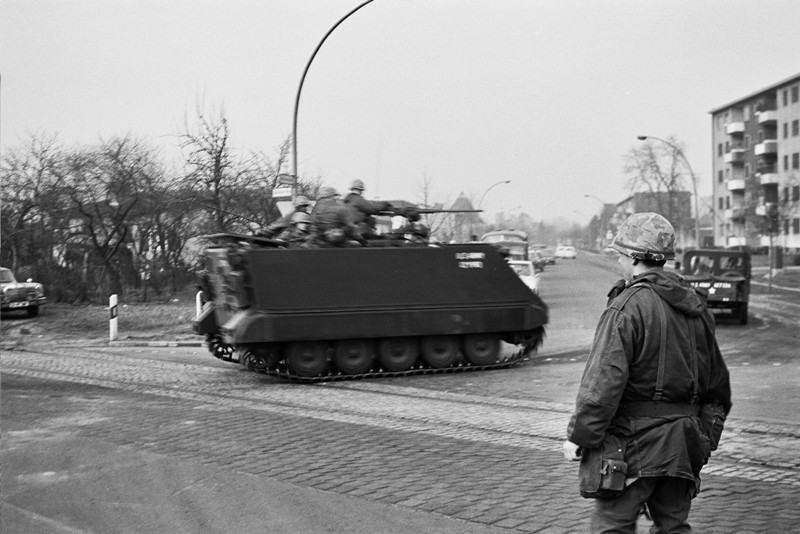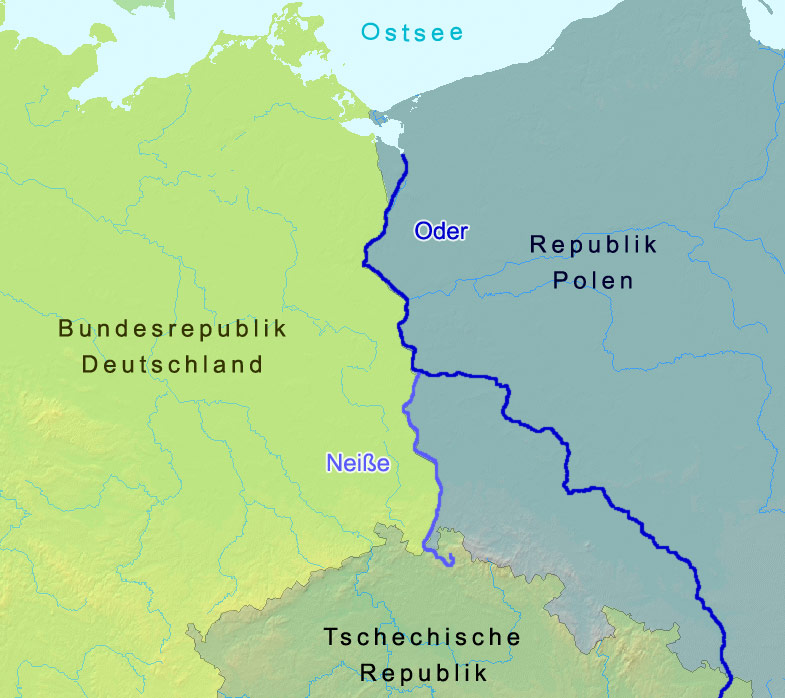|
Berlin Crisis Of 1958–1959
The Berlin Crisis of 1958–1959 was a crisis over the status of West Berlin during the Cold War. It resulted from efforts by Soviet leader Nikita Khrushchev to react strongly against American nuclear warheads located in West Germany, and build up the prestige of the Soviet satellite state of East Germany. American President Dwight D. Eisenhower mobilized NATO opposition. He was strongly supported by German Chancellor Konrad Adenauer, but the United Kingdom went along reluctantly. There was never any military action. The result was a continuation of the status quo in Berlin, and a move by Eisenhower and Khrushchev toward détente. The Berlin problem had not disappeared, and escalated into a major conflict over building the Berlin Wall in 1961. See Berlin Crisis of 1961. Background Emigration through East Berlin Between 1945 and 1950, over 1.5 million people emigrated from Soviet-occupied Eastern European countries to the West. Entry into West Germany from the East was relatively ... [...More Info...] [...Related Items...] OR: [Wikipedia] [Google] [Baidu] |
West Berlin
West Berlin ( or , ) was a political enclave which comprised the western part of Berlin from 1948 until 1990, during the Cold War. Although West Berlin lacked any sovereignty and was under military occupation until German reunification in 1990, the territory was claimed by the West Germany, Federal Republic of Germany (FRG or West Germany), despite being entirely surrounded by the East Germany, German Democratic Republic (GDR or East Germany). The legality of this claim was contested by the Soviet Union and other Eastern Bloc countries. However, West Berlin de facto aligned itself politically with the FRG from May 1949 and was thereafter treated as a ''de facto'' city-state of that country. After 1949, it was directly or indirectly represented in the institutions of the FRG, and most of its residents were citizens of the FRG. West Berlin was formally controlled by the Western Allies and entirely surrounded by East Berlin and East Germany. West Berlin had great symbolic signi ... [...More Info...] [...Related Items...] OR: [Wikipedia] [Google] [Baidu] |
1960 U-2 Incident
On 1 May 1960, a United States Lockheed U-2, U-2 reconnaissance aircraft, spy plane was shot down by the Soviet Air Defence Forces while conducting photographic aerial reconnaissance inside Soviet Union, Soviet territory. Flown by American pilot Francis Gary Powers, the aircraft had taken off from PAF Base Peshawar, Peshawar, Pakistan, and crashed near Sverdlovsk, Russia, Sverdlovsk (present-day Yekaterinburg), after being hit by a surface-to-air missile. Powers parachuted to the ground and was captured. Initially, American authorities claimed the incident involved the loss of a civilian weather research aircraft operated by NASA, but were forced to admit the mission's true purpose a few days later after the Soviet government produced the captured pilot and parts of the U-2's surveillance equipment, including photographs of Soviet military bases. The incident occurred during the tenures of American president Dwight D. Eisenhower and Soviet leader Nikita Khrushchev, around two ... [...More Info...] [...Related Items...] OR: [Wikipedia] [Google] [Baidu] |
1958 In East Germany
Events January * January 1 – The European Economic Community (EEC) comes into being. * January 3 – The West Indies Federation is formed. * January 4 ** Edmund Hillary's Commonwealth Trans-Antarctic Expedition completes the third overland journey to the South Pole, the first to use powered vehicles. ** Sputnik 1 (launched on October 4, 1957) falls towards Earth from its orbit and burns up. * January 13 – Battle of Edchera: The Moroccan Army of Liberation ambushes a Spanish patrol. * January 27 – A Soviet-American executive agreement on cultural, educational and scientific exchanges, also known as the "Lacy-Zarubin Agreement, Lacy–Zarubin Agreement", is signed in Washington, D.C. February * February 1 – Egypt and Syria unite to form the United Arab Republic. * February 2 – The ''Falcons'' aerobatic team of the Pakistan Air Force led by Wg Cdr Zafar Masud (air commodore), Mitty Masud set a World record loop, world record performing a 16 aircraft diamon ... [...More Info...] [...Related Items...] OR: [Wikipedia] [Google] [Baidu] |
Soviet Union–United States Relations
Relations between the Soviet Union and the United States were fully established in 1933 as the succeeding bilateral ties to those between the Russian Empire–United States relations, Russian Empire and the United States, which lasted from 1809 until 1917; they were also the predecessor to the current bilateral ties between the Russia–United States relations, Russian Federation and the United States that began in 1992 after the end of the Cold War. The relationship between the Soviet Union and the United States was largely defined by mistrust and hostility. The Operation Barbarossa, invasion of the Soviet Union by Nazi Germany, Germany as well as the Attack on Pearl Harbor, attack on the U.S. Pacific Fleet at Pearl Harbor by Imperial Japan marked the Soviet and American entries into World War II on the side of the Allies of World War II, Allies in June and December 1941, respectively. As the Soviet–American alliance against the Axis powers, Axis came to an end following the A ... [...More Info...] [...Related Items...] OR: [Wikipedia] [Google] [Baidu] |
Foreign Relations Of The Soviet Union
After the Russian Revolution, in which the Bolsheviks took over parts of the collapsing Russian Empire in 1918, they faced enormous odds against the German Empire and eventually negotiated terms to pull out of World War I. They then went to war against the White movement, Pro-independence movements in the Russian Civil War, pro-independence movements, Tambov rebellion, rebellious peasants, Kronstadt rebellion, former supporters, Makhnovshchina, anarchists and Allied intervention in the Russian Civil War, foreign interventionists in the Russian Civil War, bitter civil war. They set up the Soviet Union in 1922 with Vladimir Lenin in charge. At first, it was treated as an unrecognized pariah state because of its Repudiation of debt at the Russian Revolution, repudiating of tsarist debts and threats to destroy capitalism at home and around the world. By 1922, Moscow had repudiated the goal of world revolution, and sought diplomatic recognition and friendly trade relations with the cap ... [...More Info...] [...Related Items...] OR: [Wikipedia] [Google] [Baidu] |
Battles And Conflicts Without Fatalities
A battle is an occurrence of combat in warfare between opposing military units of any number or size. A war usually consists of multiple battles. In general, a battle is a military engagement that is well defined in duration, area, and force commitment. An engagement with only limited commitment between the forces and without decisive results is sometimes called a skirmish. The word "battle" can also be used infrequently to refer to an entire operational campaign, although this usage greatly diverges from its conventional or customary meaning. Generally, the word "battle" is used for such campaigns if referring to a protracted combat encounter in which either one or both of the combatants had the same methods, resources, and strategic objectives throughout the encounter. Some prominent examples of this would be the Battle of the Atlantic, Battle of Britain, and the Battle of France, all in World War II. Wars and military campaigns are guided by military strategy, whereas battl ... [...More Info...] [...Related Items...] OR: [Wikipedia] [Google] [Baidu] |
Cold War History Of Berlin
Cold is the presence of low temperature, especially in the atmosphere. In common usage, cold is often a subjective perception. A lower bound to temperature is absolute zero, defined as 0.00K on the Kelvin scale, an absolute thermodynamic temperature scale. This corresponds to on the Celsius scale, on the Fahrenheit scale, and on the Rankine scale. Since temperature relates to the thermal energy held by an object or a sample of matter, which is the kinetic energy of the random motion of the particle constituents of matter, an object will have less thermal energy when it is colder and more when it is hotter. If it were possible to cool a system to absolute zero, all motion of the particles in a sample of matter would cease and they would be at complete rest in the classical sense. The object could be described as having zero thermal energy. Microscopically in the description of quantum mechanics, however, matter still has zero-point energy even at absolute zero, because ... [...More Info...] [...Related Items...] OR: [Wikipedia] [Google] [Baidu] |
Willy Brandt
Willy Brandt (; born Herbert Ernst Karl Frahm; 18 December 1913 – 8 October 1992) was a German politician and statesman who was leader of the Social Democratic Party of Germany (SPD) from 1964 to 1987 and concurrently served as the Chancellor of Germany, chancellor of West Germany from 1969 to 1974. He was awarded the Nobel Peace Prize in 1971 Nobel Peace Prize, 1971 for his efforts to strengthen cooperation in Western Europe through the EEC and to achieve reconciliation between West Germany and the countries of Eastern Europe. He was the first Social Democratic chancellor since 1930. Fleeing to Norway and then Sweden during the Nazi regime and working as a left-wing politics, left-wing journalist, he took the name Willy Brandt as a pseudonym to avoid detection by Nazi agents, and then formally adopted the name in 1948. Brandt earned initial fame as Governing Mayor of Berlin, governing mayor of West Berlin. He served as the Minister for Foreign Affairs (Germany), foreign minis ... [...More Info...] [...Related Items...] OR: [Wikipedia] [Google] [Baidu] |
Rapacki Plan
The Rapacki Plan (pronounced Rapatz-ki) was a proposal presented in a speech by Polish Foreign Minister Adam Rapacki to the United Nations General Assembly on 2 October 1957 as a limited plan for nuclear disarmament and demilitarization in Central Europe by establishing a nuclear-free zone. The plan declared that the People's Republic of Poland would not station or produce any nuclear armaments within their territory, if the Federal Republic of Germany and the German Democratic Republic agreed to do the same. Czechoslovakia would later include itself in support of the nuclear-free zone.David Stefancic (1987). "The Rapacki Plan: A Case Study of European Diplomacy." ''East European Quarterly'' 21.4: 405 The plan followed attempts by both Western Powers and the Soviet Union to de-escalate Cold War tensions and push for greater disarmament during the mid 1950s. Overview The plan was supported by all of the Soviet-dominated states of the Warsaw Pact, However, during a NATO Counc ... [...More Info...] [...Related Items...] OR: [Wikipedia] [Google] [Baidu] |
History Of Berlin
The history of Berlin starts with its foundation in the 12th century. It became the capital of the Margraviate of Brandenburg in 1237, and later of Brandenburg-Prussia, and the Kingdom of Prussia. Prussia grew about rapidly in the 18th and 19th centuries and formed the basis of the German Empire in 1871. The empire would survive until 1918 when it was defeated in World War I. After 1900 Berlin became a major world city, known for its leadership roles in science, the humanities, music, museums, higher education, government, diplomacy and military affairs. It also had a role in manufacturing and finance. During World War II, bombing, artillery, and ferocious street-by-street fighting destroyed large parts of Berlin. Berlin was subsequently divided among the four major Allied powers and for over four decades it encapsulated the Cold War confrontation between West and East. With the reunification of Germany in 1990, Berlin was restored as the capital and as a major world city. ... [...More Info...] [...Related Items...] OR: [Wikipedia] [Google] [Baidu] |








